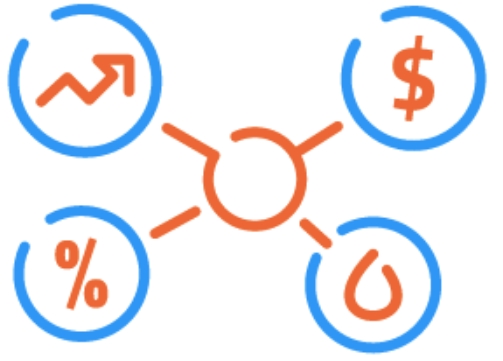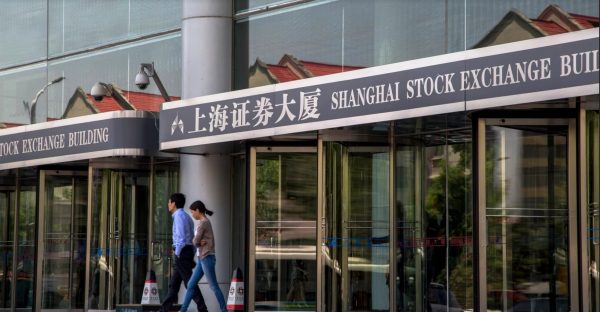Trading without financial markets knowledge is like going shopping without knowing where the mall is. Only when you answer the questions: what are financial markets and how do they work, can you master them for consistent profits. With this blog, we will have financial markets explained in the most easy-to-understand way to make sure you can start your trading career right and easily.

What Are Financial Markets? – Financial Markets 101
Financial markets can be confusing as they go by many terms. They are also called capital markets, Wall Street, and even simply “the markets.” In the simplest words, financial markets are where traders buy and sell assets. These marketplaces include (but not limited to) the stock market, bond market, Forex market, and derivatives market. They are vital for capitalist economies to operate smoothly.
Understanding the Financial Markets
Financial markets are vital to facilitating the smooth operation of capitalist economies by allocating resources and creating liquidity for businesses and entrepreneurs. They create securities products providing a return for those who have excess funds (lenders/investors) and make these funds available to those who need additional money (borrowers).
To ensure that the markets set prices that are efficient and appropriate, financial markets rely heavily on informational transparency. The market prices of securities may not indicate their intrinsic value because of macroeconomic forces such as taxes.

Financial markets vary, some are small with little activity while others, like the New York Stock Exchange (NYSE), trade trillions of dollars of securities daily.
Pros of Financial Markets
- Financial Markets offer investors to invest in shares for a short or long duration depending upon the amount of investment.
- Thanks to financial markets, firms can easily get loans at low cost and with lower interest rates, and even without collateral.
- From financial markets, companies can even raise capital. Investors can be guided about the market investment and provided accurate information by intermediaries.
- With the regulation of SEBI in the market, investors feel secure to invest in the market, which helps to regulate the economy.
Cons of Financial Market
- The processing of the financial market can be time-consuming as it requires lots of formalities like opening a Demat account, approaching depositors, etc.
- This process involves strict rules and regulations, which might discourage many investors from entering.
- Financial markets are prone to market risk i.e., which means the customer may get huge losses.
Types of Financial Markets
If you do some Googling, you might see different answers to “How many types of financial markets are there?”. Some say 5 financial markets, some others say 7 types of markets. In this blog, we will list down 8 types of financial markets based on their different instruments traded and their maturity.
Capital market
The capital market aids in raising long-term capital, generally over 1 year. It comprises a primary and a secondary market and can be divided into two main subgroups: The stock market and the Bond market.

- To provide financing, the Bond market accumulates debt through bond issuance and bond trading.
- To provide financing, the Stock market shares the ownership of a company through stock issuing and trading.
A primary market (a.k.a “new issue market”) is where securities like shares and bonds are being created and traded for the first time without using any intermediary in the process.
A secondary market (a.k.a “aftermarket”) is the place where investors purchase previously issued securities like stocks, bonds, futures, and options from other investors, instead of issuing companies themselves. The secondary market is where the bulk of exchange trading takes place and it is what people are talking about when they refer to the “stock market”. Some well-known secondary markets to name are the NYSE and Nasdaq.
However, some previously issued stocks are not listed on an exchange, but rather traded directly between dealers by computer or over the telephone. These so-called over-the-counter traded stocks, or “unlisted stocks”, are traded on the Over the Counter Bulletin Board or on the pink sheets and are either penny stocks or offered by companies with a poor credit rating.
Money Market
The money market allows economic units to manage their liquidity positions through lending and borrowing loans on a short-term basis, generally under 1 year. It facilitates the interaction between those with temporary surpluses of funds and those who are experiencing a temporary shortage of funds.

For easier understanding, via a standard instrument, one can borrow money within a quite short period of time, the so-called “call money”. After one day, from 12:00 PM today until 12:00 PM on the next day, these funds become “on call” and are callable at any time. In some cases, “call money” can be borrowed for up to one week.
For a longer period of time, from overnight to several weeks and up to one year, banks and other financial institutions (excluding retail investors and smaller trading parties) use the so-called “Interbank market” to borrow funds. While some of the trading can be performed by banks on account of their clients, most transactions happen when a bank experiences extra liquidity, a surplus of funds, while another has a shortage of liquidity.
Foreign Exchange Market

The foreign exchange market aids foreign exchange trading. With an average traded value of more than $5 trillion per day, it’s the largest, most liquid market in the world. It includes every currency in the world and any individual, company or country can participate in it.
Commodity Market

This market manages the trading in primary products which occurs in about 50 major commodity markets where entirely financial transactions increasingly outrun physical purchases which are to be delivered.
- Commodities are commonly divided into two subgroups.
- Hard commodities: raw materials typically mined, such as gold, oil, iron, rubber, ore, etc.
- Soft commodities: typically grown agricultural primary products such as wheat, coffee, cotton, sugar, etc.
Derivatives Market

It facilitates the trading of financial instruments such as options and futures contracts and is used to aid control financial risk. The instruments derive their value mostly from the value of an underlying asset such as stocks, bonds, currencies, commodities, or mortgages. The derivatives market is classified into two parts which are of completely different legal means and nature to be traded.
Exchange-Traded Derivatives

These are standardized contracts (futures, call options, and put options) traded on an organized futures exchange. Trading in such uniformed instruments requires payment of an initial deposit from investors which is settled through a clearing house and aims at removing the risk for any of the two parties not to cover their obligations.
Over-the-Counter Derivatives

These are tailor-made contracts privately negotiated and traded directly between the two parties, without using the services of an intermediary. Securities such as forwards, exotic options, swaps, forward rate agreements, credit derivatives, and other exotic derivatives are almost always traded this way. These contracts remain largely unregulated and provide the seller and buyer with more flexibility in meeting their needs.
Insurance Market

The insurance market is meant to relocate various risks. Insurance is used to transfer the risk of a loss from one counterpart to another in exchange for a payment. This market is where two peers, an insurer and the insured, or the so-called policyholder, meet in an attempt to strike a deal primarily used by the client to hedge against the risk of an uncertain loss.
Examples of Financial Markets
Here are three of the most common financial markets examples:
Stock Market
The stock market is where we sell, buy, and issue shares of publicly traded companies. The most prominent exchanges in the U.S. include New York Stock Exchange (NYSE) and the Nasdaq. The NYSE, the largest stock exchange in the world, boasts some of the oldest publicly traded U.S. companies while the Nasdaq boasts the biggest names in technology such as Apple, Alphabet, and Microsoft.

Other large exchanges around the world include the Shanghai Stock Exchange (China), the Tokyo Stock Exchange (Japan), and the London Stock Exchange (England). To learn more about trading in the stock market, check out our Stock Trading courses.
Bond Market
The bond market is where investors buy and sell debt securities. Despite its name, this market includes trading notes and bills also. There are multiple reasons governments and companies issue debt such as reducing overall debt, funding growth projects, or simply helping maintain day-to-day operations.
As stated above, the bond market can be classified into two categories: the primary market and the secondary market. Individual investors typically need help from retail brokers to participate in the bond market.
Commodities Market
The commodities are where investors buy, sell, and trade hard and soft commodities such as oil, gold, or corn. Major commodity exchanges in the U.S. include the New York Mercantile Exchange (NYMEX), the Chicago Mercantile Exchange (CME), and the Intercontinental Exchange (ICE).
How Do Financial Markets Work?
Before getting to know how financial markets work, let’s look at how a normal market works. People trust markets every day. When they go to wet markets or supermarkets, they see the current market price of a product. They often do not question whether that price is “right” or “wrong”. They might decide the price is too high and refuse to make a purchase. If enough buyers feel the same way, then the market will lower the price to sell its products.

However, in financial markets, people’s perception of how markets work often breaks down because they assume the price of a stock or bond may not be “right”. Therefore, they have to predict, or forecast, what the right price should be. The prices produced by the market are based on the opinions and expectations of highly motivated, highly skilled, and well-informed experts who trade stocks and bonds frequently. This makes financial markets an effective information-processing machine, and the real-time information brought by sellers and buyers helps set prices. The collective estimates of price by so many traders usually result in an accurate price.
What Are the Main 4 Functions of Financial Markets?
Financial markets perform various functions to give strength to the economy. And here are their 4 major functions:
1. Mobilizing Savings and Channelizing Them into More Productive Uses:
Financial markets give more meaning to the savings of the people. Instead of staying useless in the form of cash, these savings will be sent to places where it is really needed. Many financial instruments are made available to transfer finance from one side to the other side. Investors can invest in these instruments at their disposal.
2. Facilitating Price Discovery:
Demand and supply decide the price of any goods or services. Like goods and services, the investors are also determined to discover the price of their securities. Financial markets are helpful to the investors in giving them the proper price.

3. Providing Liquidity to Financial Assets:
In financial markets, buyers and sellers of all securities are available all the time, which provides liquidity to securities. It means that investors can invest their money in securities whenever they desire through the medium of financial markets. They can also convert their investment into money at any time.
4. Reducing the Cost of Transactions:
To buy and sell securities, people need various types of information that might take much time and money. However, in financial markets, every type of information is available at no cost, which results in reducing the cost of transactions.
Why Are Financial Markets Important?
Financial markets are vital for a healthy economy as it brings people together to create more values.
- They provide a place for participants like investors and debtors, regardless of their size, to receive fair and proper treatment.
- They provide individuals, companies, and government organizations with access to capital when needed.
- They help reduce the unemployment rate because of the many job opportunities they offer.
Who Are the Main Participants in Financial Markets?
The main participants in financial markets include banks, primary dealers (PDs), financial institutions (FIs), stock exchanges, brokers, investment bankers (merchant bankers), foreign institutional investors (FIIs), custodians, and depositories.

Learning about financial markets is essential for everyone, from those who wish to begin a trading career to those who want to learn more about how the economy functions and how to make more informed personal investing decisions. We hope with this thorough blog, you have learned the necessary information regarding financial markets to approach them properly and profitably. To get a more in-depth understanding of the markets and how to benefit from them, check out these courses: Larry Williams – Cracking The Money Code And Mind Over Markets – James F.Dalton.


